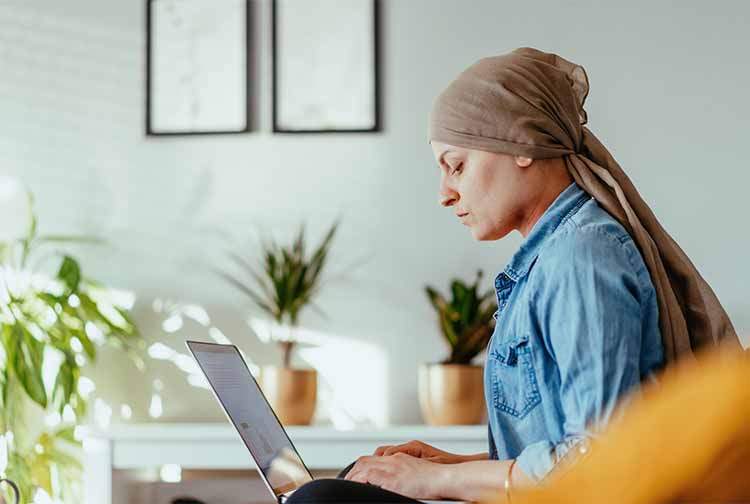
COVID conspiracy theories and cancer patients: Massey acts to protect those most open to misinformation
February 16, 2022 Photo: Getty Images
Photo: Getty Images
By Erin Hare
Conspiracy theories and other forms of COVID-19 misinformation are all over the internet. While some ideas are relatively harmless, others are more dangerous — sowing seeds of doubt in vaccines and leading some people to swallow dangerous chemicals, such as the horse de-wormer ivermectin.
Researchers at VCU Massey Cancer Center have found that cancer patients in active treatment are more likely to believe COVID-19 misinformation than people without cancer. And cancer patients who have completed their treatment are least likely to fall for these fictions.
Using online survey data from about 900 people across the country, the researchers also found that older people and women are less likely to believe COVID rumors than men and younger people — who tend to use social media more heavily.
“COVID is the first pandemic taking place in the social media era,” said study lead author Jeanine Guidry, Ph.D., a member of the Cancer Prevention and Control research program at VCU Massey Cancer Center. “Social media makes everyone a content creator, often just by forwarding messages with a comment – and frequently it’s misinformation.”
Researchers asked survey participants if they agreed with each of 21 false statements about COVID-19. A third of the participants were cancer patients in active treatment, a third were cancer survivors not in active treatment and a third had no cancer history. Survey questions spanned the spectrum of common COVID-19 myths.
Why the differences? Could be level of anxiety.
“What we’re thinking is that if you’re undergoing cancer treatment, you may have a heightened level of anxiety and may be looking for information on the internet, so you’re more exposed to misinformation,” said Guidry, who is also an assistant professor in the Richard T. Robertson School of Media and Culture and director of the Media+Health Lab at VCU.
On the other hand, cancer survivors who are no longer in treatment may have more experience evaluating what they read online.
“Our cancer survivors, they’ve gone through this journey and come out the other end knowing you can’t believe everything you read on the internet. They know you have to talk to your doctor and other people who are knowledgeable about these issues,” said study senior author Bernard Fuemmeler, Ph.D., M.P.H., associate director for population science and Gordon D. Ginder, M.D., chair in cancer research at VCU Massey Cancer Center as well as professor of health behavior and policy at the VCU School of Medicine.
The study complements an earlier paper from the same group, which showed that parents of children with cancer were particularly vulnerable to COVID-19 misinformation. Together, the research reinforces the idea that being in the stressful position of navigating cancer treatment leaves people open to being misled.
How to counter misinformation
According to the authors of the more recent study, one solution is to “vaccinate” against misinformation. By intentionally exposing people to dubious claims clearly labeled as bunk before they grab a foothold in popular consciousness, it’s possible to build “immunity” so that people are less likely to believe misinformation when encountered in the wild.
The researchers note that it's important for cancer doctors to invite questions from their patients about how the pandemic, including the vaccines, may affect their treatment. Patients can then base their decisions on the highest quality information.
“Cancer patients are in an especially vulnerable position, and it’s our duty as health care providers to help them weather the ‘infodemic’ of misinformation so they can have the best possible outcome under these challenging circumstances,” said study co-author Robert A. Winn, M.D., director and Lipman chair in oncology at VCU Massey Cancer Center and senior associate dean for cancer innovation at VCU School of Medicine.
Massey at the forefront of countering COVID myths
Since the start of the pandemic, Massey has been addressing COVID misinformation through its Facts & Faith Fridays. The program is led by Winn along with local community activist and cancer survivor Rudene Mercer Haynes and Fifth Street Baptist Church Pastor F. Todd Gray.
Nearly every Friday since March 2020, Winn, Haynes, Gray and guests —including President Biden’s chief medical advisor Tony Fauci, M.D. — have met with local faith leaders to share the latest COVID-19 public health advice.
Recently, Facts & Faith Fridays added a segment called “myth busters.” During this time, Massey researcher Katherine Tossas, Ph.D., shares an emerging COVID-19 rumor and explains why it’s not true — herself becoming a misinformation “vaccine.”
Guidry’s team, in addition, is developing a program to help patients, both at VCU Health and beyond, make decisions about vaccines and boosters using the latest scientific evidence.
Additional authors of the study include Kellie Carlyle, Ph.D., M.P.H., of the VCU School of Medicine; Carrie Miller, Ph.D., M.P.H., Vanessa Sheppard, Ph.D., of the VCU School of Medicine and VCU Massey Cancer Center; and Albert Ksinan, Ph.D., of Masaryk University in the Czech Republic.
See All News See COVID News

.ashx)
